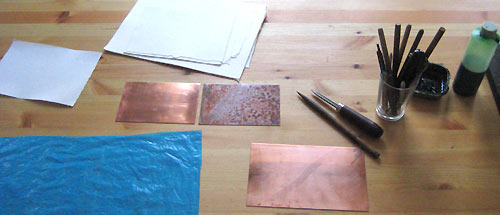Printmaking

Like the development of spoken and written language, the invention
of paper and printing was a huge step for humankind. Religions
spread over countries, various kinds of information could be widely communicated.
Over centuries, printmaking techniques emerged, had their primes, were replaced
by others. Today, some of them are used mainly or exclusively as artist mediums.
Compared with other visual arts, printmaking shows some special
qualities. Asthetically printmaking is connected to drawing
and painting while working on the plate can pass into the area
of sculpture.
The successful creation of a print especially from several plates might require
detailed planning and analysis as well as logistic and experience
in handling materials like wood, metal or paper.
A special quality of printmaking is the option to keep single working steps
or states which can be reproduced after the works completion, or even can be
reworked by re-using old plates as new starting points.
Printmaking has a certain social element –
as the reasonable priced multiple naturally refers to a bigger audience, by
the fact that the easily reproduced print made printmaking perfectly suited
for political expression, and lastly in the places of printmaking,
the studios where artists meet and exchange aesthetic and technical
ideas.
Making prints means consistently being confronted with new situations and thus
being forced to find solutions for new emerging problems. It requires patience
and makes the present of meditative moments and the thrilling moment of pulling
a first proof. It is fun.
On these pages I present the three printmaking techniques I
am mainly using in my own art work: intaglio, woodblock and screen printing.
 Intaglio, the printing from metal plates, is a
printmaking technique which is deeply connected to the European art history.
Here I explain the process of
Intaglio, the printing from metal plates, is a
printmaking technique which is deeply connected to the European art history.
Here I explain the process of  printing a drypoint intaglio.
printing a drypoint intaglio.
 Woodblock printmaking is one of the oldest printmaking technique. I am cutting
and printing my own woodblocks using the technique of the
Woodblock printmaking is one of the oldest printmaking technique. I am cutting
and printing my own woodblocks using the technique of the
 Japanese woodblock
print. Very important for that is the Japanese woodblock
print. Very important for that is the  Japanese paper. Here I also demonstrate the
Japanese paper. Here I also demonstrate the  printing process of a woodblock print by the Japanese technique.
printing process of a woodblock print by the Japanese technique.
The first (woodblock) prints were done in China. Here I present
information about history and technique of the  traditional Chinese woodblock print and the
traditional Chinese woodblock print and the  Chinese folk art woodblock print.
And there is also as an excursion of my short trip into the world of working
with
Chinese folk art woodblock print.
And there is also as an excursion of my short trip into the world of working
with  Chinese
porcelain. Chinese
porcelain.
 Screen printing is a recent printmaking technique, based on stencilling.
Here I demonstrate the
Screen printing is a recent printmaking technique, based on stencilling.
Here I demonstrate the  process of screen printing. And this is
a report on
process of screen printing. And this is
a report on  kazazome,
a traditional Japanese stencil technique, used for dying fabric and paper. kazazome,
a traditional Japanese stencil technique, used for dying fabric and paper.
 |